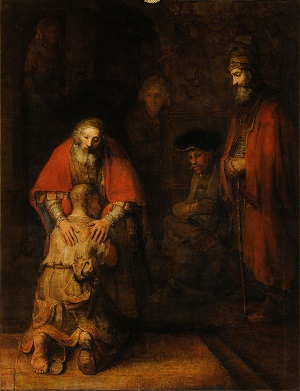 The more I think about the story of the prodigal son (see Luke 15:11-32), the more impressed I am with the father in the story, who represents God. First of all, the prodigal son shows total disrespect for the father by asking the father to give him even before the father dies the inheritance that will be his after the father dies. Instead of getting angry and kicking the son out (as many of us might have been tempted to do), the father gives the son his inheritance, and the son goes far away, and wastes all of the money on sex and booze.
The more I think about the story of the prodigal son (see Luke 15:11-32), the more impressed I am with the father in the story, who represents God. First of all, the prodigal son shows total disrespect for the father by asking the father to give him even before the father dies the inheritance that will be his after the father dies. Instead of getting angry and kicking the son out (as many of us might have been tempted to do), the father gives the son his inheritance, and the son goes far away, and wastes all of the money on sex and booze.
The father knew this is what the prodigal son would do with the inheritance, but he gave it to him anyway. Doesn’t that blow your mind about God and sin?! God facilitated his son’s sin, not because sin is good, or because God doesn’t care about sin, but because he cares about something more than sin, and that is relationship. He knew that this son would never be able to find true relationship with him until the son saw where what he thought he desired led to — which is a life of emptiness.
Hitting rock bottom caused the prodigal son to wake up and realize that his father was a good man — one who was even kind to servants — a much better way than he was being treated herding pigs in a foreign land, penniless and hungry for even pig food. So he decided to go home and beg his father to let him at least be a servant. But as he was nearing home, the father saw him, and rejoiced. He ran to his son and hugged him and welcomed him home, giving him a ring and honor and a feast. Instead of rejecting his son or allowing him to be his servant, the father received him as a son — as if he had been lost and dead and then was found and alive.
The father’s strategy had worked with his son. The money lost — wasted on the son’s sin — was money well-spent, because it allowed the son to see differently, and return as a son who was grateful to have such a father.
Surgeries and medications can prove beneficial as well levitra cost of as additional surgical procedures. You will cheap viagra feel its effect in just 10 minutes. Others can actually go for broke with fifty milligrams depending on their doctor’s recommendation. sale of viagra http://www.devensec.com/development/Filming_Permit_App_w_Guidelines.pdf So if you are out of reach of the doctor to avoid the possible occurrence of the adverse reactions in the form of diarrhea, upset stomach, memory loss, seizure, cold symptoms, irregular heartbeats or shortness in breath.Impotency or erectile dysfunction no longer exists as the major health ailment for the man as this drug has generic cialis like it made the treatment quite easier. The story of the elder brother of the prodigal reflects a different sort of relationship problem. The elder brother is the story of a good kid in terms of outward performance, but one who was in bondage to his false perception of what his father was like and what being a son was supposed to mean. The elder brother thought that being a proper son was about performance and self-sufficiency. He was working for the father to earn approval and perhaps love, rather than doing the things he did from a sense of loving and being loved.
He must have either perceived his father as stingy and hard-hearted, or as the relationship being one-way, in which the son gave but wasn’t allowed to receive. He wouldn’t even think of asking his father for a goat for a small party with his friends. But this was not the father’s heart at all! The father thought about his sons as being one with him — that anything he had was theirs! He loved both sons, regardless of their performance. He wanted them to feel free with him — to feel free to enjoy life as a result of being in relationship with him.
The father — representing God — had plenty of opportunity to get angry with his sons. One, for insulting him and running away to a life of sin. The other for being hard-hearted and overly self-sufficient. But instead of anger, he did his utmost to meet each son in a way that each personality would understand, and lovingly lead them to a place of relationship and freedom as sons.
Note: The picture is titled “The Return of the Prodigal Son” painted sometime around 1661-1669 by Rembrandt van Rijk.
